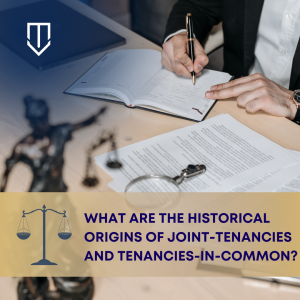 There are two common ways an individual can own property: (1) as a tenant in common or (2) as a joint tenant. In California, there is a presumption that the co-owners of a piece of property are tenants in common unless the deed expressly states that the co-owners are joint tenants.
There are two common ways an individual can own property: (1) as a tenant in common or (2) as a joint tenant. In California, there is a presumption that the co-owners of a piece of property are tenants in common unless the deed expressly states that the co-owners are joint tenants.
In a joint tenancy, there is a right of survivorship, meaning that when one joint tenant dies, the surviving joint tenant inherits the other joint tenant’s interest in the property. There is no right of survivorship in a tenancy in common. In certain circumstances, different rules or laws apply when a property is held in a joint tenancy versus a tenancy in common. For example, there are certain laws for property taxes that apply for a tenancy in common that is different from a joint tenancy.
At the Underwood Law Firm, our attorneys are more than familiar with property taxes and the requirements that follow. This area of law can be complex and entangled in technicalities. Our attorneys are here to walk you through the law step-by-step so that you are not lost in the maze of rules and regulations and to get the best possible results from transferring your property ownership.
 California Partition Law Blog
California Partition Law Blog


 Following the explosive split between the two stars in the hit reality show, “Vanderpump Rules,” many are left wondering what will become of the couple’s $2.2 million dollar home. Prior to their split, Ariana Madix and Tom Sandoval bought a farmhouse-style home in 2019 and took their time to renovate the Property into their dream home.
Following the explosive split between the two stars in the hit reality show, “Vanderpump Rules,” many are left wondering what will become of the couple’s $2.2 million dollar home. Prior to their split, Ariana Madix and Tom Sandoval bought a farmhouse-style home in 2019 and took their time to renovate the Property into their dream home.  A
A 
 “Joint tenancy” is a phrase that most people associate with the co-ownership of a property. And indeed, this is correct. Joint tenancy is a form of co-ownership in California, second only to
“Joint tenancy” is a phrase that most people associate with the co-ownership of a property. And indeed, this is correct. Joint tenancy is a form of co-ownership in California, second only to In California, business enterprises can take many forms (LLCs, corporations, partnerships, etc.). But perhaps the most unique is the “joint venture,” a special entity that, more often than not, is
In California, business enterprises can take many forms (LLCs, corporations, partnerships, etc.). But perhaps the most unique is the “joint venture,” a special entity that, more often than not, is  Partitions by appraisal are a unique way to resolve a
Partitions by appraisal are a unique way to resolve a  American law has its roots in the laws of England. As such, many of the laws still on the books in the 21st Century depend on what English judges thought prior to our War for Independence began in 1776. Because our modern laws go back centuries since before the United States was a country, we should care about how our legal terms were originally understood as they may implicate a judge’s decision today. The most important of all the English Judges who influenced our modern laws was most likely Sir William Blackstone.
American law has its roots in the laws of England. As such, many of the laws still on the books in the 21st Century depend on what English judges thought prior to our War for Independence began in 1776. Because our modern laws go back centuries since before the United States was a country, we should care about how our legal terms were originally understood as they may implicate a judge’s decision today. The most important of all the English Judges who influenced our modern laws was most likely Sir William Blackstone.  Yes. When co-owners of property decide they want to go their separate ways but cannot come to an agreement on a buyout or reimbursements, they can institute a partition action and have the court system solve the problem for them.
Yes. When co-owners of property decide they want to go their separate ways but cannot come to an agreement on a buyout or reimbursements, they can institute a partition action and have the court system solve the problem for them.  A “waste” claim is a means of recovering damages when a tenant on real property does substantial damage to the property itself. Most often, a waste claim arises when a person renting property causes damage while living there. But a waste claim isn’t restricted to landlords and tenants. It applies to nearly all situations where two or more people have some sort of interest in the common property.
A “waste” claim is a means of recovering damages when a tenant on real property does substantial damage to the property itself. Most often, a waste claim arises when a person renting property causes damage while living there. But a waste claim isn’t restricted to landlords and tenants. It applies to nearly all situations where two or more people have some sort of interest in the common property.